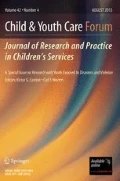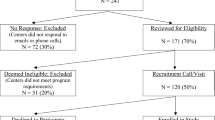Abstract
Over 1300 teachers from randomly selected child care centers in five representative metropolitan areas of the United States were interviewed and observed. Most were women in their childbearing years. Years of experience in the field of child care was not a good indicator of teacher behavior. Formal education was a better predictor than specialized training. However, both formal education and very high levels of specialized training prepare teachers to be effective in the classroom. For preschool teachers, it seems a bachelor's degree in any subject or specialized training at the college level is an effective route in competent teaching. Infant and toddler teachers appear more likely to need college level specialized training.
Similar content being viewed by others
References
Arnett, J.L. (1989). Caregivers in day care centers: Does training matter?J of Applied Developmental Psychology, 10(4), 541–552.
Berk, L. (1985). Relationship of caregiver education to child-oriented attitudes, job satisfaction, and behavior towards children.Child Care Quarterly, 14, 103–129.
Gowen, J.W. (1987). Facilitating play skills: Efficacy of a staff development program.Early Childhood Research Quarterly, 2, 55–66.
Harms, T., & Clifford, R. (1980).Early childhood environmental rating scale. New York: Teachers College Press.
Harms, T., & Clifford, R. (1986).Infant-toddler environmental rating scale. Unpublished document, University of North Carolina, Chapel Hill.
Hayes, S., Palmer, F., & Zaslow, M. (1990).Who cares for America's Children: Child care policy for the 1900s. Washington, D.C.: National Academy Press.
Roup, R., Travers, J., Glantz, R., & Coelen, C. (1979).Children at the Center. Final Report of the National Day Care Study. Cambridge, MA: ABT Associates.
Whitebook, M., Howes, C., & Phillips, D., (1990).Who cares: Child care teachers and the quality of care in America. Final report of the National Child Care Staffing Study. Oakland, CA: Child Care Employee Project.
Author information
Authors and Affiliations
Additional information
Child Care Employee Project
The National Child Care Staffing Study was supported by a group of foundations including Carnegie, Ford, Foundation for Child Development, Smith-Richardson, Spunk, and Mailman Family Fund, and was coordinated by the staff of the Child Care Employee Project. We are also grateful to the team of 42 people who conducted the interviews and observations and coded and analyzed the data for this project. Special thanks to the child care teachers who talked with us and the centers who participated.
Rights and permissions
About this article
Cite this article
Howes, C., Whitebook, M. & Phillips, D. Teacher characteristics and effective teaching in child care: Findings from the national child care staffing study. Child Youth Care Forum 21, 399–414 (1992). https://doi.org/10.1007/BF00757371
Issue Date:
DOI: https://doi.org/10.1007/BF00757371




